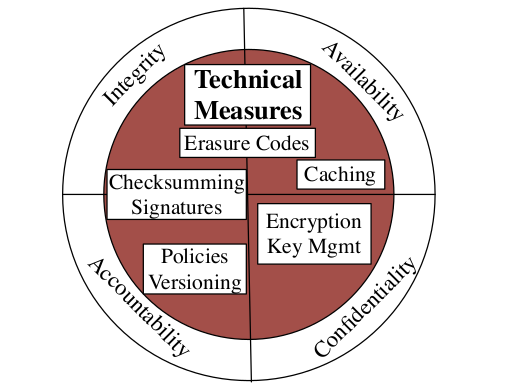
Abstract
Cloud infrastructures are nowadays an irreplaceable component within modern IT-infrastructures.
Due to their representing abstraction regarding the physical execution framework from the deployment of the service, clouds not offer valuable attributes like scalability, environmental protection by best utilization of hardware resources, pay-as-you-go billing but also problem fields especially when it comes to the storage of confidential data. More concise, secure utilization of common cloud infrastructures like provided by Google, Microsoft or Amazon generate not only an indistinguishable impact to computer science but also to law science. As a consequence, based upon the confidentially of the data and the different methods and parties able to access this information, the safeness of the data must not only be provided by applying technical security measures upon the cloud-stored information but also by the investigation of legal issues going along with the flexibility of the cloud. To fill this gap, our contribution bases upon two pillars:
- We discuss legal issues going along with the storage of (especially confidential) data on cloud infrastructures provided by third parties.
- Besides the legal issues, we further investigate technical measures how to ensure secure data storage on a technical level utilizing the benefits of cloud infrastructures (namely the scalability and availability).
BibTeX (Download)
@inproceedings{Graf2012Legal,
title = {A Legal and Technical Perspective on Secure Cloud Storage},
author = {Sebastian Graf and Jörg Eisele and Marcel Waldvogel and Marc Strittmatter},
url = {https://netfuture.ch/wp-content/uploads/2012/graf12legal.pdf},
year = {2012},
date = {2012-05-20},
urldate = {1000-01-01},
booktitle = {5. DFN-Forum Kommunikationstechnologien: Verteilte Systeme im Wissenschaftsbereich},
pages = {63-72},
crossref = {DBLP:conf/dfn/2012},
abstract = {Cloud infrastructures are nowadays an irreplaceable component within modern IT-infrastructures.
Due to their representing abstraction regarding the physical execution framework from the deployment of the service, clouds not offer valuable attributes like scalability, environmental protection by best utilization of hardware resources, pay-as-you-go billing but also problem fields especially when it comes to the storage of confidential data. More concise, secure utilization of common cloud infrastructures like provided by Google, Microsoft or Amazon generate not only an indistinguishable impact to computer science but also to law science. As a consequence, based upon the confidentially of the data and the different methods and parties able to access this information, the safeness of the data must not only be provided by applying technical security measures upon the cloud-stored information but also by the investigation of legal issues going along with the flexibility of the cloud. To fill this gap, our contribution bases upon two pillars:<ul><li>We discuss legal issues going along with the storage of (especially confidential) data on cloud infrastructures provided by third parties.</li><li>Besides the legal issues, we further investigate technical measures how to ensure secure data storage on a technical level utilizing the benefits of cloud infrastructures (namely the scalability and availability).</li></ul>Based upon these investigations, we propose a technical model for secure cloud storage and interpret the measures against common aspects from the area of jurisprudence. Besides, we show that the area of jurisprudence still offers many open issues related to cloud based storage which represent a challenge for end-users as well as complex institutions like universities.},
keywords = {Cloud Storage, Security},
pubstate = {published},
tppubtype = {inproceedings}
}



